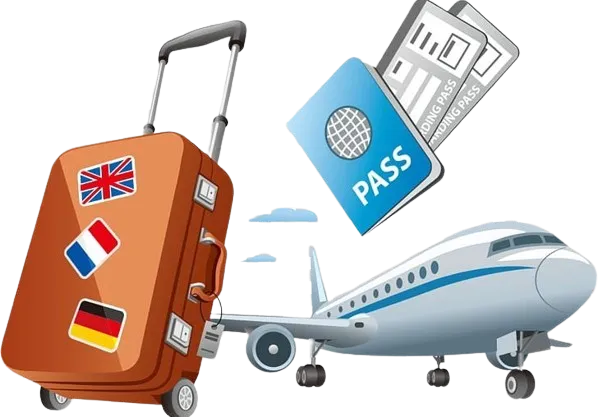Egyptian passport holders enjoy visa-free travel to 50 different countries worldwide. This guide offers extensive information on destinations accessible to Egyptian citizens without a visa, including visa-free, visa-on-arrival, and Electronic Travel Authorization (eTA) countries. It also outlines countries that require advance visas for Egyptians, including electronic visas (eVisas) and regular visas.

Visa-Free Travel Options for Egypt Passport Holders
Egyptian passport holders have the privilege of visa-free travel to a selection of 17 countries. These destinations do not require Egypt citizens to obtain a visa before their arrival. However, it's crucial to remember that the terms and conditions of these visa exemptions can vary from one country to another.
Egyptian passport holders can travel to Barbados, Benin, Cook Islands, Dominica, Gambia, Guinea, Haiti, Hong Kong, Iran, Jordan, Macao, Malaysia, Mauritius, Micronesia, Rwanda, Saint Kitts and Nevis, and St. Vincent and the Grenadines without needing a visa. These countries offer visa-free access to Egyptian citizens, allowing them to explore various destinations for tourism, business, or other purposes. However, the specific terms and conditions for entry may vary, so travellers are advised to check the latest information and entry requirements for their chosen destination.
Visa on Arrival Options for Egypt Passport Holders
For Egypt passport holders, a visa on arrival is an accessible option in 32 countries. In most cases, this means that travellers can obtain a visa at the airport or a designated border crossing point upon their arrival. It's important to note that the specific fees, validity periods, and permitted lengths of stay may vary between these countries.
Egyptian passport holders can obtain visas on arrival in a diverse range of 32 countries, including Bolivia, Burkina Faso, Burundi, Cambodia, Cape Verde, Comoros, Ghana, Guinea-Bissau, Indonesia, Laos, Lebanon, Madagascar, Maldives, Marshall Islands, Mauritania, Mozambique, Nepal, Nicaragua, Nigeria, Niue, Palau, Samoa, Senegal, Seychelles, Somalia, Tajikistan, Tanzania, Timor-Leste, Togo, Tuvalu, Yemen, and Zimbabwe.
Upon reaching the immigration checkpoint at the destination country, travellers may be required to complete necessary paperwork, submit required documentation, and pay the applicable visa fee. Following these procedures, the immigration officer will issue the visa, granting authorization to enter and stay in the country for the specified purpose and duration.
Electronic Travel Authorization (eTA) for Egypt Passport Holders
For Egypt passport holders, an Electronic Travel Authorization (eTA) is required in only one country. An eTA is a digital travel document that must be obtained online in advance of travel for eligible travellers who are exempt from obtaining a traditional visa for their destination. The application process for eTAs in many countries is typically straightforward and efficient, often resulting in approval within hours or a few days.
- Sri Lanka
It's essential to recognize that eligibility for an eTA can vary depending on the traveller's nationality and the specific requirements of the destination country. Therefore, it is advisable for travellers to thoroughly review the entry requirements of the destination country prior to making travel plans.
Countries Requiring E-Visa Applications for Egypt Citizens
Egyptian passport holders planning to travel to the following 39 countries are required to apply for an electronic visa (eVisa) prior to their trip. An eVisa is a digital visa application that can be completed online and is often delivered to the applicant's email address. The processing times, fees, and validity of eVisas can vary from one country to another.
These countries include Albania, Antigua and Barbuda, Armenia, Australia, Bahamas, Bahrain, Bhutan, Botswana, Cameroon, Colombia, Congo (Dem. Rep.), Côte d'Ivoire (Ivory Coast), Djibouti, Ecuador, Ethiopia, Gabon, Georgia, Kenya, Kyrgyzstan, Lesotho, Malawi, Moldova, Montserrat, Myanmar, Oman, Pakistan, Sao Tome and Principe, Sierra Leone, Singapore, South Africa, South Sudan, St. Helena, Suriname, Turkey, Uganda, United Arab Emirates, Uzbekistan, Vietnam, and Zambia.
Egyptian citizens are required to apply for eVisas through the respective country's online visa application systems before their intended travel. The specific requirements and processing times may vary, so it is advisable to review the visa application process for the chosen destination.
To obtain an e-Visa:
- Complete an online application form.
- Provide personal and passport information.
- Upload necessary documents, such as a passport-sized photo.
- Pay the relevant visa fee.
- Wait for the application to be reviewed and approved.
- Receive the eVisa in a PDF or another electronic format.
- Print a copy to carry with you when travelling.
Specific requirements may vary depending on the traveller's nationality and the destination country.
Countries Requiring Visas for Egypt Passport Holders
Egyptian citizens require traditional visas for 140 countries, necessitating application through the destination's embassy or consulate, with varying procedures and requirements contingent on nationality and destination regulations.
These countries include a wide range of destinations such as Afghanistan, Algeria, American Samoa, Andorra, Angola, Argentina, Australia, Austria, Azerbaijan, Bangladesh, Belarus, Belgium, Belize, Bermuda, Bosnia and Herzegovina, Brazil, Canada, Central African Republic, Chad, Chile, China, Costa Rica, Croatia, Cuba, Cyprus, Czech Republic, Denmark, Dominican Republic, El Salvador, Equatorial Guinea, Eritrea, Estonia, Eswatini, Falkland Islands, Faroe Islands, Fiji, Finland, France, French Guiana, French Polynesia, Germany, Gibraltar, Greece, Greenland, Grenada, Guam, Guatemala, Guyana, Honduras, Hungary, Iceland, India, Iraq, Ireland, Israel, Italy, Jamaica, Japan, Kazakhstan, Kiribati, Kosovo, Kuwait, Latvia, Liberia, Libya, Liechtenstein, Lithuania, Luxembourg, Mali, Malta, Mayotte, Mexico, Monaco, Mongolia, Montenegro, Morocco, Namibia, Nauru, Netherlands, New Caledonia, New Zealand, Niger, Norfolk Island, North Korea, North Macedonia, Northern Mariana Islands, Norway, Palestinian Territories, Panama, Papua New Guinea, Paraguay, Peru, Philippines, Poland, Portugal, Puerto Rico, Qatar, Reunion, Romania, Russia, Saint Lucia, San Marino, Saudi Arabia, Serbia, Slovakia, Slovenia, Solomon Islands, South Korea, Spain, St. Maarten, St. Pierre and Miquelon, Sudan, Sweden, Switzerland, Syria, Taiwan, Thailand, Tonga, Trinidad and Tobago, Tunisia, Turkmenistan, Turks and Caicos Islands, Ukraine, United Kingdom, United States of America, Uruguay, US Virgin Islands, Vanuatu, Vatican City, Venezuela, Wallis and Futuna.
The specific visa processing times, fees, and required documents can vary based on the traveller's nationality and the regulations of the destination country.
How to Apply for a Visa as an Egyptian Citizen
The visa application process involves the following steps:
- Schedule an Appointment
Start by contacting a local visa application centre within Egypt and schedule an appointment to submit your visa application. It's important to be aware that securing an appointment with the embassy or consulate may take several months due to demand and availability.
- Prepare Your Documents
To ensure a successful visa application, it's essential to gather all the required documents. These typically include your passport, completed application form, and health insurance coverage, among others. Some of these documents may need verification with an apostille stamp or certification from a foreign office.
- Submit Your Application
Once you have collected and prepared all the necessary documents, you can proceed to submit your visa application. This often involves attending a visa interview and may also require the submission of biometric data. Be sure to comply with any translation and apostille stamp requirements specified by the embassy or consulate. Following the submission of your application, it may take several weeks for a decision to be reached regarding your visa.
Required Documents for Egyptian Citizens Applying for a Visa
When Egyptian citizens plan to visit countries that necessitate prior visa applications, they typically need to provide specific documents, though the precise requirements can vary depending on the destination country. Nevertheless, the following documents are commonly requested:
- Valid Egyptian Passport: Your current Egyptian passport is a fundamental requirement. In some cases, countries may demand that your passport remains valid for more than six months beyond your planned departure from their territory. Additionally, a photocopy of the passport may be necessary.
- Visa Application Form: You must complete the visa application form as per the requirements of the respective country.
- Passport Photos: Recent passport photos, usually not older than six months, are typically required.
- Travel Health Insurance: You will need to show proof of travel health insurance that covers the entire duration of your stay in the destination country.
- Visa Fee Payment: It's essential to provide evidence of payment for the visa fee, as per the fees established by the destination country.
- Detailed Travel Itinerary: A comprehensive travel itinerary that outlines all the places you intend to visit during your stay may be necessary.
- Letter of Invitation: If applicable, you may need a letter of invitation from a host or sponsor in the destination country.
- Proof of Return Ticket: Many countries require proof of a booked return ticket for your journey back to Egypt.
- Proof of Accommodation: You may be asked to provide documentation demonstrating that you have booked accommodation for your stay.
- Financial Means Verification: Showing that you have adequate funds to cover your expenses during the visit is often a requirement.
- Civil Status Documents: Documents such as marriage certificates, birth certificates, or any other relevant civil status documents might be requested.
FAQS
Can Egyptian passport holders travel to any countries without a visa in 2023?
Egyptian passport holders have visa-free access to some countries in 2023, allowing them to travel without obtaining a visa beforehand. However, the list of visa-free countries may change over time, and it is essential to check the latest information and specific entry requirements for your intended destination.
Which countries are included in the visa-free list for Egyptians in 2023?
The 17 visa-free countries for Egyptian citizens in 2023 include Barbados, Benin, Cook Islands, Dominica, Gambia, Guinea, Haiti, Hong Kong, Iran, Jordan, Macao, Malaysia, Mauritius, Micronesia, Rwanda, Saint Kitts and Nevis, and St. Vincent and the Grenadines.
Are there countries that offer visa on arrival for Egyptians in 2023?
Yes, Egyptian nationals can obtain visas on arrival in 32 countries in 2023. The requirements, fees, and validity of these visas may vary, so it's important to research and plan accordingly.
How can Egyptians apply for an e-visa in 2023?
To apply for an e-visa, Egyptian citizens typically need to visit the official website of the destination country's immigration or visa authority. The application process varies by country, but it generally involves completing an online form, providing necessary documents, and paying the visa fee. Processing times and requirements differ, so thorough research is recommended.
What documents do Egyptian citizens need to apply for a visa in 2023?
The required documents for visa applications in 2023 usually include a valid passport, visa application form, passport photos, travel health insurance, proof of visa fee payment, detailed travel itinerary, letter of invitation (if applicable), proof of return ticket, proof of booked accommodation, evidence of sufficient funds, and civil status documents (marriage certificates, birth certificates, etc.). However, the specific requirements may vary by destination.
Can I use a visa from one country to enter other countries in 2023?
Generally, visas issued by one country do not grant you entry into other countries. Each nation has its visa policies and requirements. If you plan to visit multiple countries, it's crucial to check the visa requirements for each destination and obtain the necessary visas accordingly.
How can I stay updated on visa requirements for Egypt passport holders in 2023?
To stay informed about visa requirements and travel restrictions for Egyptian citizens in 2023, you should regularly check the official websites of the embassies or consulates of your destination countries, as well as consult with relevant travel authorities and agencies.
